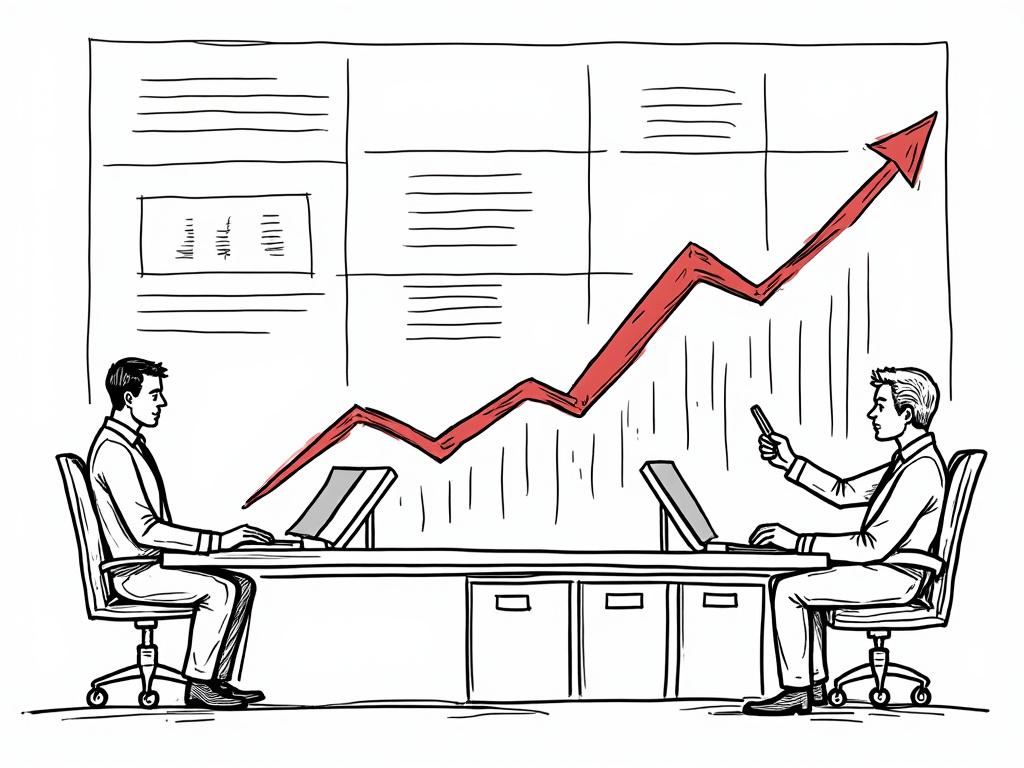
Economic Growth Forecasts for Greece: Navigating Recovery and Future Opportunities
Reading time: 8 minutes
Ever wondered if Greece has truly turned the corner from its economic crisis? You’re not alone in questioning the country’s financial trajectory. After a decade-long struggle, Greece is finally showing promising signs of recovery, but understanding the nuances of its economic forecasts requires more than just surface-level optimism.
Let’s dive into the real data, expert predictions, and practical implications that matter for investors, businesses, and anyone considering Greece as an economic opportunity.
Table of Contents
- Current Economic Landscape
- Growth Forecasts 2024-2026
- Key Drivers of Recovery
- Sector-by-Sector Analysis
- Challenges and Risks Ahead
- Investment Opportunities
- Charting Greece’s Path Forward
- Frequently Asked Questions
Current Economic Landscape: From Crisis to Cautious Optimism
Greece’s economic transformation tells a remarkable story of resilience. After losing nearly 25% of its GDP during the 2010-2018 crisis, the country has achieved four consecutive years of positive growth. The numbers speak volumes: GDP grew by 5.9% in 2022 and 2.1% in 2023, significantly outpacing the eurozone average.
Current Economic Indicators (2024):
- GDP Growth Rate: 2.3%
- Unemployment Rate: 10.8% (down from 27.5% peak)
- Inflation Rate: 2.9%
- Government Debt-to-GDP: 161.9%
- Current Account Balance: -6.8% of GDP
The European Commission’s autumn 2024 forecast paints an encouraging picture, with Greece expected to maintain steady growth momentum. According to EU Economic Commissioner Paolo Gentiloni, “Greece represents one of Europe’s most compelling recovery stories, demonstrating how targeted reforms can restore economic confidence.”
Growth Forecasts 2024-2026: What the Experts Predict
Multiple international organizations have released forecasts for Greece’s economic trajectory, and the consensus is cautiously optimistic. Here’s what leading institutions predict:
| Organization | 2024 Forecast | 2025 Forecast | 2026 Forecast | Key Assumptions |
|---|---|---|---|---|
| European Commission | 2.3% | 2.5% | 2.4% | Continued EU funding, tourism recovery |
| IMF | 2.1% | 2.3% | 2.2% | Structural reforms, investment growth |
| OECD | 2.4% | 2.6% | 2.5% | Green transition, digital transformation |
| Bank of Greece | 2.5% | 2.7% | 2.6% | Export growth, private investment |
| Alpha Bank | 2.2% | 2.4% | 2.3% | Real estate recovery, manufacturing |
Regional Growth Variations
Greece’s economic recovery isn’t uniform across all regions. Athens and Thessaloniki are leading the charge, while islands and rural areas show more modest progress. The government’s regional development strategy aims to bridge this gap through targeted infrastructure investments and tax incentives.
Comparative Regional Performance
Regional GDP Growth Projections (2024-2025)
Key Drivers of Economic Recovery
Understanding Greece’s growth story requires examining the fundamental drivers propelling its economy forward. These aren’t just statistical improvements—they represent structural changes that could sustain long-term growth.
EU Recovery Fund Impact
Greece is set to receive €30.5 billion from the EU’s Recovery and Resilience Facility through 2026. This represents roughly 17% of the country’s GDP—one of the highest ratios in the EU. The funding focuses on digital transformation, green energy, and infrastructure modernization.
Quick Scenario: Imagine you’re a renewable energy company looking at Greece. The country aims to achieve 35% renewable energy by 2030, up from 22% today. This transition, funded partly by EU money, creates substantial opportunities for investors and businesses in the green sector.
Tourism Renaissance
Tourism, accounting for roughly 20% of Greece’s GDP, has rebounded dramatically. In 2023, Greece welcomed 33 million visitors—exceeding pre-pandemic levels. The sector’s resilience stems from diversification strategies, including:
- Year-round tourism promotion
- Medical and wellness tourism development
- Digital nomad visa programs
- Luxury hospitality investments
Maria Theofanopoulou, CEO of the Greek Tourism Confederation, notes: “We’re not just recovering—we’re transforming. The focus has shifted from quantity to quality, sustainability, and value-added experiences.”
Sector-by-Sector Growth Analysis
Greece’s economic recovery isn’t a one-size-fits-all story. Different sectors are experiencing varying degrees of growth, creating a complex but opportunity-rich landscape.
Technology and Digital Services
The tech sector has emerged as Greece’s surprise success story. With government initiatives like the “Digital Transformation Bible” and tax incentives for startups, the sector grew by 8.3% in 2023. Major tech companies, including Microsoft and Amazon, have established significant operations in Greece.
Case Study: Greek fintech company Viva Wallet was acquired by JPMorgan Chase for €1.95 billion in 2022, demonstrating the sector’s maturation and international appeal.
Real Estate Market Dynamics
The real estate sector shows robust growth, driven by foreign investment and domestic demand recovery. Property prices in Athens increased by 12.1% year-over-year in 2023, while Thessaloniki saw 9.8% growth. This trend presents opportunities for those considering buying real estate in greece, whether for investment or residence purposes.
Manufacturing and Exports
Greek manufacturing has benefited from “friend-shoring” trends, with companies seeking EU-based production alternatives. The sector grew by 4.2% in 2023, with particular strength in food processing, pharmaceuticals, and renewable energy equipment.
Navigating Challenges and Risks
Despite positive forecasts, Greece faces several challenges that could impact growth trajectories. Understanding these risks is crucial for realistic planning and investment decisions.
Demographic Pressures
Greece’s aging population and “brain drain” phenomenon pose long-term challenges. The country loses approximately 50,000 young professionals annually to other EU countries. Government initiatives, including the “Rebrain Greece” program, aim to reverse this trend through tax incentives and career opportunities.
Debt Sustainability Concerns
While manageable in the current low-interest environment, Greece’s debt-to-GDP ratio of 161.9% remains high. Rising interest rates could pressure public finances, though the country’s improved fiscal position provides some buffer.
Pro Tip: Investors should monitor the European Central Bank’s monetary policy decisions, as they directly impact Greece’s borrowing costs and economic flexibility.
Strategic Investment Opportunities
Greece’s economic recovery creates specific opportunities for savvy investors and businesses. Here’s where the smart money is looking:
Green Energy Transition
With ambitious renewable energy targets and EU funding support, Greece offers compelling opportunities in:
- Solar and wind project development
- Energy storage solutions
- Smart grid infrastructure
- Green hydrogen production
Digital Infrastructure
The government’s digital transformation agenda creates opportunities in cybersecurity, cloud services, and digital government solutions. The public sector digitalization budget exceeds €2 billion through 2026.
Tourism Infrastructure
Beyond traditional hospitality, opportunities exist in:
- Sustainable tourism technologies
- Cultural heritage preservation projects
- Marina and yacht service facilities
- Conference and exhibition centers
Charting Greece’s Path to Sustained Prosperity
Greece’s economic trajectory over the next three years represents more than statistical recovery—it’s a fundamental transformation toward a more resilient, diversified economy. The convergence of EU funding, structural reforms, and private sector innovation creates a unique window of opportunity.
Your Strategic Roadmap:
- Monitor EU Fund Deployment: Track which projects receive funding to identify emerging opportunities in infrastructure, technology, and green energy
- Assess Regional Variations: Focus on Athens and Thessaloniki for immediate opportunities, while considering long-term plays in developing regions
- Leverage Tourism Recovery: Explore investments in sustainable tourism, luxury hospitality, or tourism technology solutions
- Consider Real Estate Cycles: With property markets showing strength, evaluate both residential and commercial opportunities in prime locations
- Prepare for Volatility: Despite positive trends, maintain contingency plans for external shocks or policy changes
The key insight isn’t just that Greece is growing—it’s how the country is positioning itself for sustainable, long-term prosperity. Those who understand these dynamics today will be best positioned to benefit from Greece’s continued transformation.
As global economic uncertainties persist, could Greece’s hard-won stability and strategic EU position make it an unexpected haven for forward-thinking investors and businesses?
Frequently Asked Questions
What are the most reliable sources for Greece’s economic forecasts?
The most credible forecasts come from the European Commission, IMF, OECD, and the Bank of Greece. These organizations use comprehensive methodologies and have access to detailed economic data. For investment decisions, also consider reports from major Greek banks like Alpha Bank and National Bank of Greece, which provide sector-specific insights.
How does Greece’s economic recovery compare to other EU countries that faced similar crises?
Greece’s recovery has been slower but more comprehensive than countries like Ireland or Portugal post-2008. While Ireland recovered faster due to its corporate tax advantages, Greece’s recovery is built on more diversified foundations including tourism, technology, and green energy. The country’s growth rate now matches or exceeds the eurozone average, indicating genuine momentum rather than just statistical bounce-back.
What are the biggest risks that could derail Greece’s economic growth forecasts?
The primary risks include external shocks like energy price spikes, significant interest rate increases by the ECB, or major geopolitical disruptions affecting tourism. Domestically, political instability or delays in implementing EU-funded projects could slow growth. However, Greece’s improved fiscal position and diversified economy provide better resilience than during the previous crisis.

Article reviewed by Arthur Pembridge, Agricultural Land Investor | Sustainable Farming & Timberland, on June 4, 2025




